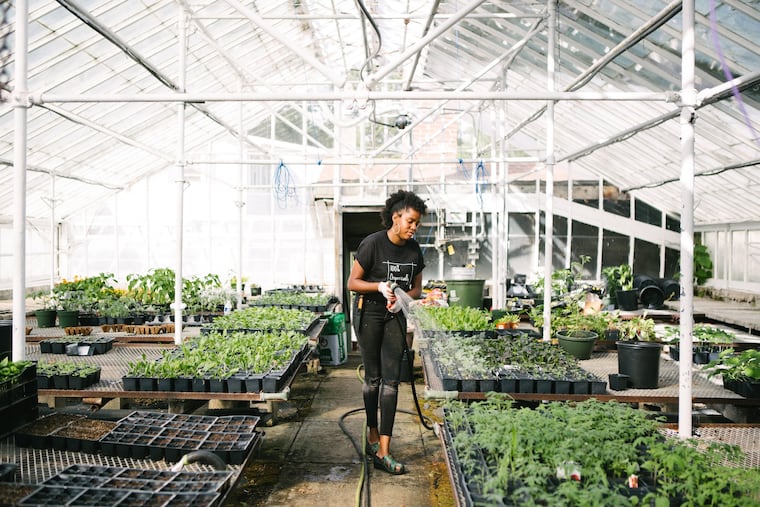Through farms, foraging, and activism, Black women are working toward a greener Philly
Activists like Christa Barfield, Danni Morinich, and Kiasha Huling are changing the way Black and other marginalized communities interact with nature.

From Japanese knotweed to garlic mustard, South Philly’s Danni Morinich, better known as Lady Danni, knows that everything serves a purpose if you know how to find it. When leading foraging walks through her neighborhood, she teaches residents how to use what grows wild around them.
In Philadelphia, environmental enthusiasts, Black women in particular, are leading green movements by creating community-led farms, leading foraging expeditions, and even tending to trees. They’re getting others outside and raising awareness about the necessity of an environmentally conscious Philadelphia.
As the city launched the Philly Tree Plan on Feb. 23 — a 10-year tree planting and care initiative by the Philadelphia Parks & Recreation and Fairmount Park Conservancy program in partnership with the Pennsylvania Horticultural Society — some have already begun to envision what a “green Philly” will grow to be.
Farmer Jawn Greenery and Farms founder Christa Barfield sees the need to reimagine community spaces for growing food. “We have so many lots just in Philadelphia alone,” she said. “Many of them are privately owned, but there are still enough that are owned by the city …[that] can be repurposed for a food forest citywide.”
Since launching her organization in 2018, Barfield has been a resource for many in the Germantown and greater Philadelphia area. As one of the few Black urban farmers in the city, she works with a small team to provide fresh and organic food grown locally for residents, as well as fight against food insecurity and food deserts that impact marginalized communities. She wants to build a greener Philadelphia that prioritizes all of its residents.
“What we’re building is bigger than just us, [and] we have to move towards this concept of collectivism,” Barfield says of what a green city should look like.
Often shut out from green spaces due to redlining and gentrification, Black women in Philadelphia have started redefining their relationship with nature, and not just for the sake of food, but for their mental and physical well-being. As scientifically shown, recreational time outdoors can boost cognitive development for young adults, reduce stress, and even raise endorphin levels and dopamine production, a factor Morinich urges Black folks and tree lovers to take advantage of.
“Because there is a lot of trauma from just being Black in America … So sometimes just [to] be out in that open air — that kind of connection, I think that’s restorative,” Morinich said.
There are many benefits of being outside — “touching plants, touching living green things,” as Morinich said — but having the knowledge of what green spaces can do and how to access them is a privilege in itself. A report made by Trust for Public Land ranking Philadelphia’s parks found that neighborhoods with a higher number of BIPOCs have access to 28% less park space than predominantly white neighborhoods.
At the intersection of environmental equity lies race and class, two factors that can determine proximity to parks and green spaces. Kiasha Huling, organizer for Clean Air Council, works to inform residents about land accessibility and tree equity, or how the placement and care of trees is impacted by income and racial demographics. She hopes to bridge the gap between access and information.
“In a very inherent and innate way, Black women bridge those gaps,” Huling says. Huling plants trees throughout West Philly and educates her neighbors on the proven effects trees have on us, our environment, even our heating bills.
Farming, foraging, and even organizing around air pollution are progressive steps in attaining accessible green spaces for everyone. These women are exhibiting unique ways residents of all ages can interact with their environment and take advantage of the spaces offered to them. Committed to educational awareness and advocating for Black and brown communities, Barfield, Morinich, and Huling are building a future for the next generation of Black and brown environmental activists still green in the thumb.
“We’re still working off a system that never had Black people in mind,” Barfield said. “That’s why we always feel like we’re fighting an uphill battle. I don’t put a lot of energy into what the city is going to do and what they’re not going to do.”
An earlier version of the article incorrectly stated the source for the data regarding access to park space. It is a report made by Trust for Public Land. It also misstated where Danni Morinich lives. She lives in South Philly.